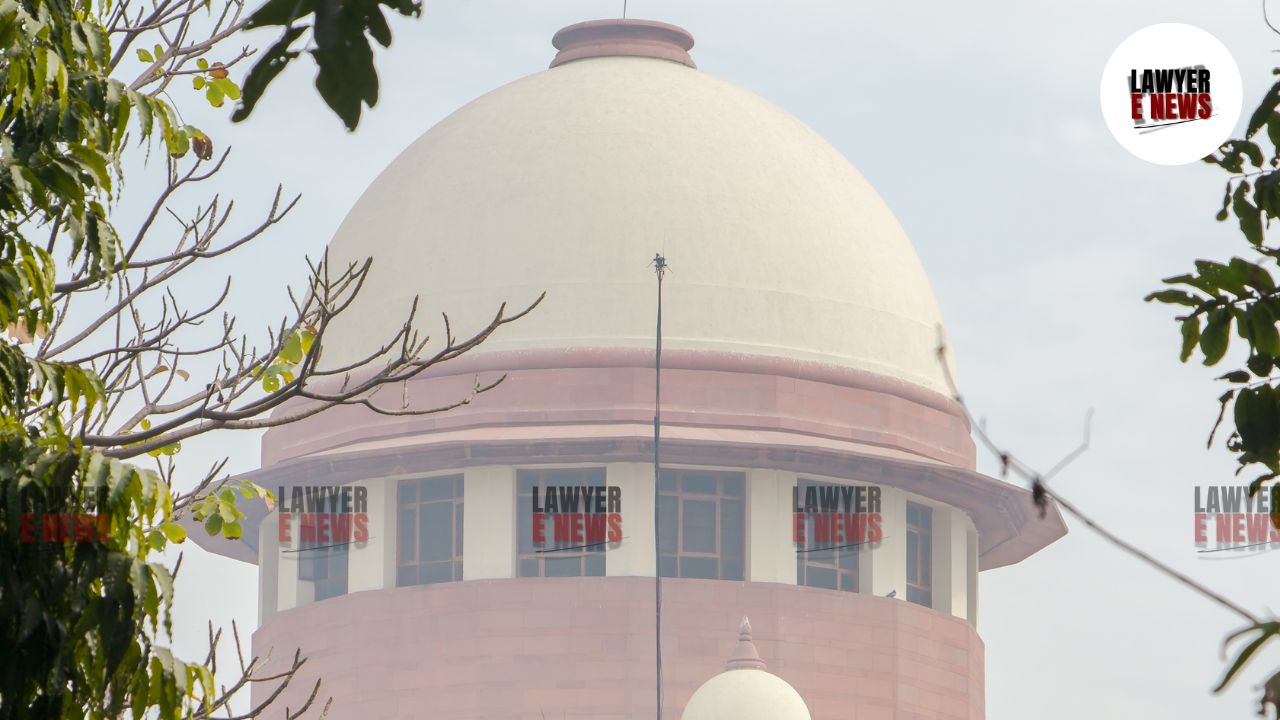-
by Admin
15 February 2026 5:35 AM



Supreme Court of India dismissed the appeals filed by the Urban Improvement Trust (UIT), Alwar, challenging the Rajasthan High Court’s decision quashing the land acquisition proceedings under Section 52(1) of the Rajasthan Urban Improvement Act, 1959 (RUI Act). The apex court held that improper service of notice under Section 52(2), delay in payment of compensation, and non-compliance with statutory timelines rendered the acquisition invalid.
The case concerned the acquisition of land in Nangli Kota and Moongaska villages in Alwar district for urban development purposes. The court held that the procedural lapses violated the constitutional right to property under Article 300A of the Constitution and emphasized that acquisition without timely payment of compensation amounted to deprivation of property without due process.
The appeals arose from land acquisition proceedings initiated in 1976 under the RUI Act. The appellant, UIT Alwar, issued notifications to acquire lands in Nangli Kota and Moongaska villages for urban improvement purposes. However, the legal heirs of the original owners challenged the acquisitions before the Rajasthan High Court, alleging procedural violations, including improper service of notice, lack of timely compensation, and non-compliance with mandatory statutory safeguards. The High Court quashed the acquisition proceedings, prompting UIT Alwar to file appeals before the Supreme Court.
Right to be Heard is Integral to Compulsory Acquisition: Supreme Court
The court highlighted that under Section 52(2) of the RUI Act, prior to issuing a notification under Section 52(1), individual notices must be served on landowners and conspicuously displayed in the locality to allow objections. However, in both cases:
For Nangli Kota lands: Though the landowners actively participated in the proceedings, the court found that no individual notices were served or pasted conspicuously in the locality, as required by Section 52(2). The court held that the landowners’ participation constituted "implied notice," thereby upholding the validity of the proceedings despite procedural lapses.
For Moongaska lands: The court found no evidence that all original landowners were served notices or participated in the proceedings. This procedural failure prejudiced the owners’ right to be heard, leading the court to invalidate the notification under Section 52(1).
Citing its prior rulings, the court reiterated that compulsory acquisition laws, being expropriatory in nature, must be strictly followed to protect the constitutional right to property.
Acquisition Without Payment of Compensation Violates Article 300A and Principles of Welfare State: Supreme Court
The court emphasized that the right to property, though no longer a fundamental right, remains a constitutional right under Article 300A. It is a human right, and any deprivation must adhere to statutory safeguards.
Under Section 60A(4) of the RUI Act (introduced via the 1987 Amendment), compensation must be tendered and paid within six months of the amendment’s commencement date (August 1, 1987). The court found that UIT Alwar failed to pay compensation for Nangli Kota lands within the prescribed period. Instead, it deposited the compensation in court only in 1997—10 years beyond the statutory deadline. This delay violated Section 60A(4) and undermined the legitimacy of the acquisition.
The court noted that possession of the Nangli Kota lands was taken in 1980, long before the payment of compensation, in violation of Section 52(7) of the RUI Act. The court observed:
"Taking possession of land prior to compensation violates the mandatory requirements of the statute and amounts to arbitrary deprivation of property."
The respondents (landowners) had agreed to accept ₹90,000 as compensation in 1980. However, the court found that this agreement did not absolve the authorities from adhering to statutory timelines. The failure to pay within the stipulated period rendered the acquisition invalid.
The court emphasized that the right to property is a constitutional and human right. Relying on Ultra-Tech Cement Ltd. v. Mast Ram (2024) and other precedents, it held that delays in payment of compensation erode the principles of equity and fairness enshrined in a welfare state.
"Improper Notice and Delay in Compensation Justify Quashing of Acquisition Proceedings"
The Supreme Court dismissed UIT Alwar’s appeals, affirming the High Court’s decision to quash the acquisition proceedings for both Nangli Kota and Moongaska lands. It concluded that the acquisition was invalid due to:
Improper Service of Notice:
Non-compliance with Section 52(2) prejudiced landowners’ right to be heard, especially for the Moongaska lands.
Violation of the six-month timeline under Section 60A(4).
Possession taken before payment breached Section 52(7) of the RUI Act.
Breach of Article 300A:The delayed compensation and procedural irregularities amounted to deprivation of property without due process.
The judgment underscores the importance of adhering to procedural safeguards in land acquisition to protect citizens’ constitutional right to property. By holding the acquisition invalid, the Supreme Court reinforced that any deprivation of property must comply strictly with statutory and constitutional requirements.
Date of decision: December 13, 2024
